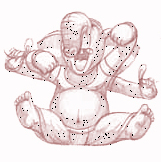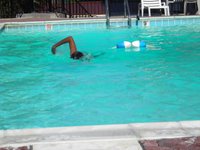And few other American activists have been willing to expose themselves to the kind of risks that Rachel Corrie took when she sat between a Palestinian home and a Caterpillar bulldozer in Gaza three years ago.
The bulldozer, driven by an Israeli army soldier on assignment to demolish the home, rolled over Corrie, who was 23 years old. She had taken a nonviolent position for human rights; she lost her life as a result. But she was rarely praised in the same U.S. media outlets that had gone into raptures over the image of a solitary unarmed man standing in front of Chinese tanks at the time of the Tiananmen Square massacre.
In sharp contrast to the high-tech killers who run the Israeli military apparatus and the low-tech killers who engage in suicide bombings, Rachel Corrie put her beliefs into practice with militant nonviolence instead of carnage. She exemplified the best of the human spirit in action; she was killed with an American-brand bulldozer in the service of a U.S.-backed government.
As her parents, Cindy and Craig Corrie, said in a statement on her birthday a few weeks after she died: "Rachel wanted to bring attention to the plight of the Palestinian people in the Occupied Territories, a people she felt were largely invisible to most Americans."
In the United States, the nonstop pro-Israel media siege aims to keep them scarcely visible.
skip to main |
skip to sidebar

please leave a comment

come on in..the waters fine

Car Colors
To truly live outside the law, you must be very honest!!
Ganesha Says -

please leave a comment
funny quote of the day
Search This Blog
About Me
Followers
my web album
Labels
- alchohol (1)
- america (13)
- apple (4)
- architecture (5)
- Arsenal (1)
- article (2)
- asok (1)
- Auroville (3)
- australia (1)
- baltimore (1)
- Beauty (1)
- bhopal (1)
- Bhutan (3)
- blackberry (1)
- blogs (18)
- books (4)
- brand (1)
- British (1)
- business (1)
- callcentres (1)
- China (2)
- chomsky (1)
- Cities (2)
- college (1)
- Comedy (29)
- Communism (3)
- comparison (1)
- Computers (11)
- consulting (1)
- Cricket (9)
- Delhi (5)
- dilbert (2)
- dylan (1)
- elections (1)
- email (1)
- Empire (1)
- Energy (2)
- environment (1)
- facts (16)
- Fisk (1)
- floyd (1)
- football (4)
- Friend (6)
- ganguly (1)
- germany (1)
- gizmo (1)
- Global village (1)
- global warming (1)
- google (1)
- gorakhpur (5)
- Graphics (5)
- Gurgaon (6)
- hindi (4)
- humor (13)
- IIT (1)
- India (47)
- industree (1)
- Internet (3)
- Interview (2)
- Iran (3)
- Iraq (12)
- Joshi (1)
- Kurt Vonnegut (1)
- Lebanon (1)
- link (2)
- Literature (4)
- Love (5)
- lyrics (2)
- me (30)
- mexico (1)
- microsoft (1)
- Middle East (15)
- mobile (1)
- Movies (5)
- music (2)
- musings (33)
- Nepal (4)
- new york (1)
- news (10)
- noida (1)
- obit (2)
- office (1)
- opinion (1)
- outsourcing (4)
- party (1)
- peace (2)
- Photo (23)
- pics (2)
- Poem (7)
- Politics (30)
- Pondycherry (1)
- Poverty (9)
- predictions (1)
- Quotes (15)
- Quran (2)
- rajasthan (1)
- rape (1)
- rave (2)
- religion (5)
- retail (1)
- review (3)
- road (1)
- roorkee (5)
- rules (1)
- rumi (2)
- samsung (1)
- sports (5)
- stocks (3)
- Story (7)
- sufi (3)
- surreal (1)
- tendulkar (1)
- tennis (1)
- tourism (2)
- tragedy (1)
- Travel (17)
- US (20)
- Useful Links (3)
- virus (1)
- Vonnegut (2)
- War (10)
- water (1)
- wenger (1)
- world (2)
- worldcup (1)
- WTO (1)
- zidane (3)
Blog Archive
-
▼
2006
(192)
-
▼
April
(23)
- "The Mythical Man Month"
- Spirituality in Music
- my hometown on wiki
- quote of the day
- Nepal - a clear look
- psychic links
- against the grain
- the war machine
- will u marry me
- On Water
- malcomX
- Rachel Corrie
- stop this madness
- Rumi
- funny quote
- pics of soldiers
- isnt communism the opposite of democracy?
- plans under development - house in gurgaon
- update - medha patkar arrested
- quick and dirty operating system.
- News - Who has the most oil?
- quote of the day
- dont worship the dead..save the living
-
▼
April
(23)
Friends n Blogs
Links
portfolio
Subscribe
whats up with me
gurgaon - Google News
Time in India
Happy Birthday to
New York Time - EST
Today in History
splashing along

come on in..the waters fine
visitors
Quote of the Day
Eye Catchers

Car Colors
helpful free software
thats all...good night and good luck
take care and come back again..
#copyright - @kash



